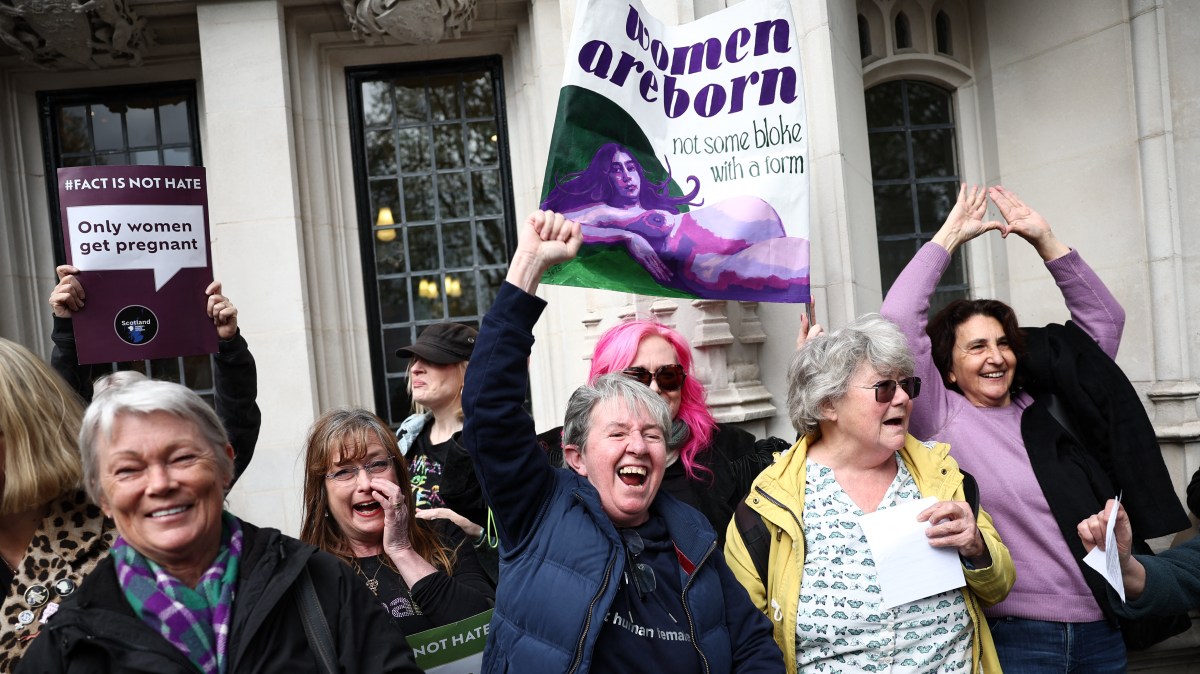Joanna Cherry, a former leading figure in the SNP, has hit out at the ex-first minister of Scotland following the Supreme Court ruling.
“I’ve had to put up with my own party leader, Nicola Sturgeon, calling me a bigot and a transphobe for sticking up for the rights of women and lesbians.
“I think she owes all of us, not just me, and more importantly the women of Scotland, an apology.”
Starmer and Swinney ‘must respect judgment’
Joanna Cherry with John Swinney during last year’s election campaign
KEN JACK/GETTY IMAGES
The prime minister and Scottish first minister must make sure that the law is obeyed after the ruling, the former Scottish MP Joanna Cherry KC said.
The SNP’s former home affairs spokeswoman, who lost her seat in last year’s general election, said she feels “hugely vindicated” by the ruling but warned it needs to be implemented into everyday practice.
“Now it’s over to the politicians to make sure that the law is obeyed.
“I’m calling on my former colleague, John Swinney, the first minister of Scotland, and on the British prime minister, Keir Starmer, to respect this judgment.”
2010 Act could have been ‘rendered meaningless’
The certificated sex interpretation would have “rendered meaningless” a section of the 2010 Equalities Act dealing with protection from discrimination on the grounds of sexual orientation, according to the ruling.
This interpretation would mean “a trans woman (a biological male) with a GRC (Gender Recognition Certificate) who remains sexually oriented to other females would become a same-sex attracted female, in other words, a lesbian” and would lead to an “inevitable loss of autonomy and dignity for lesbians” as well as impacting lesbian clubs and associations.
The judgment continues: “Read fairly, references to sex in this provision can only mean biological sex. People are not sexually oriented towards those in possession of a certificate.
Ruling ‘brings clarity for women’
Activists from For Women Scotland outside the Supreme Court on Wednesday
KIN CHEUNG/AP
The ruling brings “clarity and confidence” for women, a government spokesperson has said.
“We have always supported the protection of single-sex spaces based on biological sex. This ruling brings clarity and confidence, for women and service providers such as hospitals, refuges, and sports clubs. Single-sex spaces are protected in law and will always be protected by this government.”
Badenoch: You cannot change biological sex
Kemi Badenoch
TIMES PHOTOGRAPHER JAMES GLOSSOP
Kemi Badenoch has said the “era of Keir Starmer telling us women can have penises has come to an end”.
The Conservative leader said: “Saying ‘trans women are women’ was never true in fact, and now isn’t true in law either.
“This is a victory for all of the women who faced personal abuse or lost their jobs for stating the obvious. Women are women and men are men: you cannot change your biological sex.
“Well done to For Women Scotland!”
Equalities watchdog welcomes ruling
The equalities watchdog welcomed the ruling as having addressed challenges around single-sex spaces.
Baroness Kishwer Falkner, chairwoman of the Equality and Human Rights Commission (EHRC), said: “Today the Supreme Court ruled that a gender recognition certificate does not change a person’s legal sex for the purposes of the Equality Act.
“We are pleased that this judgment addresses several of the difficulties we highlighted in our submission to the court, including the challenges faced by those seeking to maintain single-sex spaces and the rights of same-sex attracted persons to form associations.”
Scottish government was wrong, judges say
The court ruled that the terms “sex”, “man” and “woman” in the Equality Act 2010 refer to “biological sex”.
Any other interpretation made the Equality Act “incoherent and impracticable”.
The summary read: “Therefore, a person with a Gender Recognition Certificate in the female gender does not come within the definition of a ‘woman’ under the Equality Act 2010 and the statutory guidance issued by the Scottish ministers is incorrect.”
Sex ‘refers to reality, not paperwork’, activists say
Celebrations outside the court
HENRY NICHOLLS/AFP VIA GETTY IMAGES
Campaign group Sex Matters, which had made arguments in the case, said the court had given “the right answer”.
Maya Forstater, the group’s chief executive, said: “We are delighted that the Supreme Court has accepted the arguments of For Women Scotland and rejected the position of the Scottish government.
“The court has given us the right answer: the protected characteristic of sex — male and female — refers to reality, not to paperwork.”
Ruling says Act is clear that sex is binary
In an 88-page ruling, Lord Hodge, Lady Rose and Lady Simler said: “The definition of sex in the Equality Act 2010 makes clear that the concept of sex is binary, a person is either a woman or a man.
“Persons who share that protected characteristic for the purposes of the group-based rights and protections are persons of the same sex and provisions that refer to protection for women necessarily exclude men.
“Although the word ‘biological’ does not appear in this definition, the ordinary meaning of those plain and unambiguous words corresponds with the biological characteristics that make an individual a man or a woman.”
‘It’s been a long struggle’
The ruling is a “victory for women’s rights”, the head of For Women Scotland said.
“Trans people never had these rights to access women-only space. This was an overreach. Trans people are protected like anyone else is, but this clarifies women’s rights.
“It’s been a very long road, a very long struggle. We’re all off for a good celebration now”, Trina Budge said.
Celebrations erupt outside Supreme Court
Women’s rights activists outside the Supreme Court on Wednesday
KIN CHEUNG/AP
There were scenes of jubilation outside the Supreme Court as For Women Scotland campaigners celebrate their victory.
Activists made fist pumps in their air and hugged each other after judges allowed their landmark appeal.
‘Victory for common sense’
The ruling is a “victory for common sense”, the leader of the Scottish Conservatives has said.
Russell Findlay, MSP for West Scotland, said: “A victory for woman across the United Kingdom and a victory for common sense.”
Court makes unanimous decision
Lord Hodge said it was the unanimous decision of the court that “the definition of the terms woman and sex in the Equality Act 2010 refer to a biological woman and biological sex”.
He added: “But we counsel against reading this judgement as a triumph of one or more groups in our society at the expense of another. It is not.
“As I will explain later in this handout speech, the Equality Act 2010 gives transgender people protection not only against discrimination through the protected characteristic of gender reassignment, but also against direct discrimination, indirect discrimination and harassment in their acquired gender.”
Court backs For Women Scotland appeal
The Supreme Court has ruled that only people who are born female should be protected from discrimination as a woman under the Equality Act in a landmark ruling.
In handing down the judgment, Lord Hodge has told the Supreme Court that a panel of five judges has unanimously allowed the appeal by For Women Scotland.
Feminist groups gather outside court
Women’s rights campaigners gathered outside the Supreme Court this morning for its highly anticipated judgment on the legal definition of a woman.
Among them were the Father Ted writer Graham Linehan and a social worker Lizzie Pitt, who successfully sued Cambridgeshire county council over harassment claims relating to her gender critical views.
Other campaigners held up banners bearing the dictionary definition of a woman: “Adult human female”.
The court’s three possible rulings
The UK Supreme Court
AARON CHOWN/PA
There are three possible outcomes from today’s ruling.
The court could rule in favour of the Scottish government or For Women Scotland.
There could also be a third option, where the judges say it is not for them to be making the law in this matter and that politicians must decide.
This would then become a headache for Sir Keir Starmer as the question would become about what Westminster thinks instead of what the Scottish parliament thinks.
Trans groups criticise Supreme Court
Victoria McCloud
SONJA HORSMAN FOR THE TIMES
The court has allowed Amnesty UK to participate on the Scottish government’s side, but has been criticised by trans campaigners for not hearing testimony from trans people.
Victoria McCloud, a retired judge who changed her legal sex more than 20 years ago, was barred from giving testimony. She said that meant “the only affected group was excluded”.
“If the legal sex of trans people is reversed without our consent then we will lose equal pay rights with men, to cite one example, and we will be ‘two sexes at once’ which is a nonsense,” she said.
In broad terms, if the court accepts that the definition of a woman can be broadened to include transgender women — born biologically male — who have a full GRC that changes their legal sex to female, the implication is that society’s fundamental understanding of sex will also be changed.
Another campaign group involved in the case, Sex Matters, said that this outcome would not mean that trans women with GRCs would be able demand access to women’s single-sex services, as there was still other legislation protecting these areas pertaining to the Equality Act, safeguarding, duty of care and the protection of human rights.
But it predicted that it would make it legally complicated to operate “truly single-sex facilities”.
• Supreme Court to rule on definition of ‘woman’ — what’s at stake?
When did the legal battle start?
The ruling comes after a two-day hearing in November. Feminist groups have demanded judges respect “biological reality”
PETER DAZELEY/GETTY IMAGES
The case centres on a relatively obscure piece of Scottish legislation passed in 2018 to establish gender quotas for public boards. The crucial issue is who counts as a woman for the purposes of the quotas.
For Women Scotland, a gender-critical feminist organisation, brought a judicial review over the definition of “woman”.
The Gender Representation on Public Boards Act originally stated that it included anyone who was “living” as a woman and who had either gone through or intended to go through the gender recognition process.
For Women Scotland contended that ministers had broken with the separate definitions of women and trans women laid out in the 2010 Equality Act, and had therefore acted beyond their powers.











